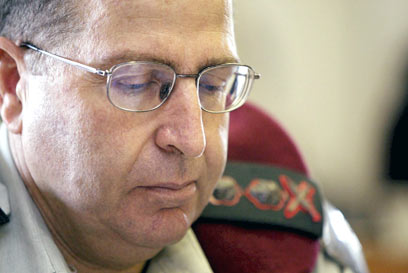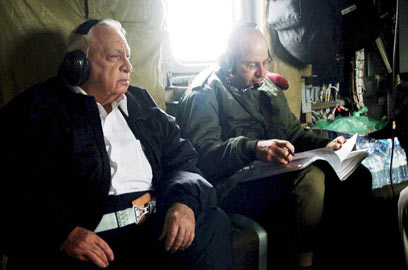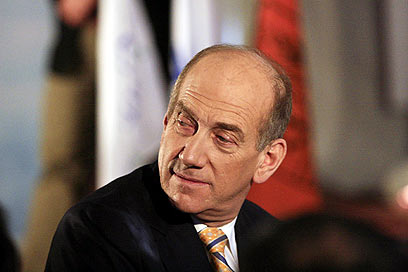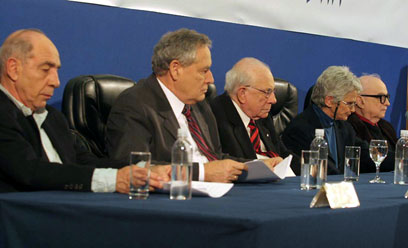
Hard day's night
Former IDF Chief Moshe Yaalon has a lot in his mind: Israel's leaders are corrupt, the political discourse is defeatist, media spins are the rule and too many people have inappropriate pull over power. But it's not personal, he says, it's a matter of principle
IDF Chief of Staff Moshe Yaalon was relieved of his command on February 14, 2005. Then-Prime Minister Ariel Sharon and Defense Minister Shaul Mofaz spun the story to look like all that happened was that Yaalon's tenure was simply not extended for a fourth year – a near-automatic extension given to all other chiefs of staff – but as far as he is concerned he was dismissed.
One year after being let go, Yaalon began putting pen to paper. "I felt I had to commit my thoughts and more importantly, my observations to paper," he says in the introduction to his newly published book, "The Long Short Road."
These observations, he told Yedioth Ahronoth, were weighing on him so much that he felt compelled to share them "with anyone who cares about the Zionist enterprise." His book, he says, is the answer to a discourse "saturated by political interests and rating considerations, and victimized by media spins."
The infamous dismissal was allotted only a short chapter in the book. The night, he writes, "Began with a ceremony honoring the wounded soldiers of the Engineering Corps, and ended with a small consultation which included myself, Mofaz and several other senior officers. Afterwards, Mofaz asked to see me in private. He told me that he and the prime minister have decided that the chief of staff's tenure would be limited to three years, instead of the traditional four.
"We were sitting in the event director's office, with half-empty plates of food around us. There was something very appropriate about this inappropriate act taking place in such an inappropriate place and time. Mofaz was obviously uncomfortable, but he was given an assignment and he carried it out. I knew perfectly well who was pulling the stings."

Not just a disgruntled ex-chief of staff (Photo: Sebastian Scheiner)
'Between a rock and a hard place'
In a sense, he says, "I was relieved after spending months between a rock and a hard place and the way the Gaza pullout took shape. Then again, I was incensed by the deceptive way in which things were presented. Unfortunately, personal aspect aside, there was some harm done to the institution of the chief of staff, to the delicate fabric of the relations between the political and military echelons.
"Replacing an opinionated chief of staff, who speaks his mind in the proper professional forums, with a chief and a deputy who were in many ways friends privy to discussions on how to look out for the prime minister's interests, was a detrimental decision; the results of which we saw, among other things, during the Second Lebanon War."
You're referring to former Chief of Staff, Dan Halutz and Deputy Chief of Staff, Major-General Moshe Kaplinski?
"In this case, yes. But not just."
Who else, then?
"I'm not going to name names. This isn't a personal thing, it's a matter of principle."
His upcoming book, he knows, will invoke a variety of responses. Past instances, however, have taught him that many of the comments will not be directed at the book, as much as at its author: "It's all a part of the spin-doctor mentality which has taken over our lives," he says. "I wouldn't write a book just to settle some scores. That's not what I'm about. If there are people mentioned in the book, they are mentioned to better illustrate the analysis, to clarify things."
The book, he stresses, in not an autobiography, despite the fact that it offers some insight into his personal history: "There are a lot of stories I could have used, each of them could probably carry a whole chapter by itself, but they didn’t make it into the book."
Why?
"Because there is only so much you can read in one sitting," he replies, knowing, of course, that his book will require more then just one sitting.
Man vs. land
In 1992 Yaalon was named head of the IDF's Judea and Samaria Division, a position he claims exposed him to the intense relations between the political and military echelons, and to the just-as- intense relation between the military and the public.
"I left the West Bank in order to command the military's training facility in Zeelim, shortly before the Oslo Accords were signed. When I was named head of Military Intelligence it was post-Oslo times. From that moment and until my tenure as chief of staff ended, I developed many insights which I feel the public discourse is lacking in. Ones I feel are essential."
Such as?
"We are unwilling to accept that the basic conflict between us and the Palestinians has nothing to do with borders, or whether or not the line would be drawn 100 yards to here or a mile to there. The conflict is about them recognizing our right to a state, it's about agreeing on two states for two peoples. Even today (Palestinian President Mahmoud) Abbas refuses to commit to that."
Where can you trace that back to? The Oslo illusion?
"I supported the Oslo Accords and I have never referred to the people who led to them as 'Oslo criminals.' My grandfather was willing to make territorial concessions in the 1930s and I believed we should do the same in the 90s. I believed, like many others in this country, that the people were what mattered, not the land – that was until I found out that contrary to what we were all told, we have no partner for this agreement. That was made evident long before the question of which side was sabotaging the process, us or the Palestinians, came up."
Evident how?
"Back in May 1994, when Yasser Arafat came back to the Gaza Strip, he smuggled Jihad Amarin – a known arch-terrorist Israel was unequivocally adamant about keeping out of Gaza – back into the Strip, in his diplomatic car. And what did we do? We looked the other way.
"Later on," he continues, "when it became obvious that the Palestinian Authority was turning a blind eye to terror attacks against Israel, I met with Arafat, in my capacity as intelligence chief. I presented him with a list of terrorists Israel wanted him to detain. It included, naturally, the 'engineer' Yahya Ayyash and his lieutenant, Muhammad Def. He looked at me and asked 'Muhammad who?'
"In another case, we found that the Palestinian schools were engaged in heavy incitement against Israel, that they were still teaching that Akko, Haifa and Jaffa were Palestinian port cities that they will one day take back. Shimon Peres was the prime minister then and when I presented him with the facts he shrugged them off, saying Arafat needed that kind of rhetoric, but that he will do the right thing eventually."

Pulling one over. Arafat (Archive photo: AP)
"Peres was the man calling the shots, the one who led Oslo. Shortly before Israel's Independence Day in 1996, we found out the Arafat's promise to change the Palestinian National Covenant went left unkept. I knew Peres was set to make a holiday speech and that he would be referring to Oslo in it. I briefed him on the matter and he still ended up sending the chairman his warm regards for keeping his end of the deal.
"What did we get? Arafat knew he was pulling the wool over our eyes, he knew we knew he was doing it. You have to ask how he took Israel's moves at the time. I say he took them as a sign of weakness."
False impressions
The Oslo Accords were a ray of hope for the first time in decades. Maybe insisting on it was the right thing to do.
"We weren't insisting on a solution."
What then?
"Political cowardliness. Politicians in Israel don't admit their failures. When the Palestinian terror war – what we call the second Intifada – began in 2000, Peres should have spoken out. He had all the intelligence needed to link Arafat to the events and still, he said nothing. Moreover, when it was proven that Arafat didn't just lose control (over the field operatives), all he said was 'why are you making Arafat to be this big strategist?'"
Why was it so important to us, in the midst of the fighting, to here Peres say something?
"Because that would have been a significant statement, both domestically and from an international standpoint. It would have been the kind of statement which proportionally assigned blame; and if you remember, there were a lot of people in the Israeli public who thought that it wasn’t the IDF's actions that brought on that upheaval.
"True, 18 months on, when the government voted in favor of launching Operation Defensive Shield, Peres voted in favor of it as well, but still, I think that when a leader moves from defining Arafat as a peace partner to defining him as an enemy – without any clear statement – then we have a problem. There is a clear ambiguity."
So how do you account for that? Is it all just political drabness, to the unwillingness to admit failure?
"No, not just. It's also an expression of the Western frame of mind that if we just push a little harder, the situation will work itself out. The modern Westerner has a problem accepting the fact that not all problems have a quick fix. Another problem is the admission of helplessness. When someone says that 'this is our fault' the underline is that if we just act differently, we would find a solution. That is the source for all the fabrications about the failure being the military's fault. Oslo failed because the Palestinians didn’t really want it, just like they didn’t really want the Annapolis Summit either."
And this is what Olmert, the savvy politician, the traditional rightist, who's been around the block once or twice, doesn’t understand?
"He understands, but like Ariel Sharon, he is a led leader, trying to appease the people. He opts for moves which not only tailwind terror, they tailwind Islamic Jihad."
Listening to the people is a healthy expression of democracy.
"It's positive because the people are the true sovereigns; the problem is that the people are being fooled."
Are you saying the (leaders) know the truth, but tell the people a different story?
"Let's just say I find it very hard to believe that they didn’t and don’t know the facts. I knew Ariel Sharon very well and I was very familiar with his views. He didn’t realize the dangers the disengagement posed? The man who constantly said that we will not negotiate under fire?"

With Ariel Sharon (Photo: GPO)
When the idea of the disengagement first came up, it met fierce public objection.
"That's not entirely accurate. It met some objections, but at the time he already dealt with some refusals within the Air Force and Sayeret Matkal (the IDF's elite special forces unit) to carry out missions in the Gaza Strip and West Bank; the police were looking into corruption allegations against him and his sons and he – if not directly than through his advisors – realized that pushing the disengagement would bolster his position."
In other words, what you're saying is that he forfeited Israel's security for his personal welfare?
"I never heard one concrete argument which substantiated that move. It was a manipulation at the expense of security."
'Cease defeatist dialogue'
Pure political corruption?
"Yes, I really think so."
Was the Annapolis Summit politically corrupt as well?
"The way Olmert conducted it, given the information at hand, yes."
But maybe insisting on Annapolis stemmed for the realization that any attempt to strike a peace agreement with the younger, more militant Palestinian generation would demand a higher price?
"I'm familiar with that claim and I disavow it completely. I reject the theory that says that what we do will dictate things to come, that we can end all wars," he says. "We can end up with an armed conflict tomorrow, regardless of the decisions we make. It's not the occupation per se. The future of the West Bank is not an issue when it comes to Israel and Iran or the Hizbullah."
That is not entirely accurate. One of the main arguments is that the relations Israel has with the Palestinians affect its relations with all Arab states.
"I negate that assumption as well. The tragedy is that we keep forging ahead while the train is running in reverse – that was the way things were when it was decided to back the Road Map and that's they way things are today, in the talks with the Palestinians. The conflict should be addressed from the bottom up: We have to insist the incitement stop, that the curriculums are fundamentally changed. We have to stop encouraging leaders who do not advocate true peace, the likes of Arafat and Abbas.
"We have to cease this defeatist dialogue, prompted mostly by obvious fatigue. This coincides with the interests of a corrupt leadership, a media which reports half-truths and businessmen who see the clam – even a mock one – as a way to maximize profit. These three elements, to me, spell a strategic threat to Israel."
Could this be a case of, as Ariel Sharon use to say, changing one's views in accordance to one's venue? Maybe it is just easier for you to say these things from your current position?
"No, it's not that. The problem is that it's easier to tell the public that 'we will make this a fun place to live in,' than it is to say we still have days of blood, sweat and tears ahead of us. If the ideal thing is a fun place to live in, we might as well pack up and move to Los Angeles. It's not the public that has grown tired. Operation Defensive Shield and the Second Lebanon War proved that. It's the leadership that has sold out the county's interests for the sake of its own. Saying a solution can be reached at this points is belittling of the concept of 'peace'. It's creating a golden calf."
And all the leaders of the past few decades are in on it?
"No. Manipulations and media spins are courtesy of Sharon and Olmert. That wasn't Yitzhak Rabin's way, nor Ehud Barak's or Benjamin Netanyahu's. Rabin was nervous about the Oslo Accords. I know that because I was chief of IDF Intelligence at the time. Netanyahu also insisted on reciprocation – it was his political rivals who came up with the concept of 'brave men's peace,' and the played into the Palestinians narrative."

Master spin doctor. Olmert (Photo: Tsafrir Abayov)
Settling scores
Surely, you must know that a lot of what you are saying can be attributed to the score you have to settle with Sharon, regarding your dismissal.
"I know there is going to be quite a bit of backlash. I could have just stayed out of the limelight and continued my fellowship at the Shalem Center Institute for Strategic Studies, and steer clear from the coming conflict with all those who would probably say that it's just a disgruntled ex-chief of staff talking. That's a card they play whenever they can't come up with a better answer."
Is it possible that you are a disgruntled ex-chief of staff?
"As chief of staff I saw it as my duty to speak my mind in the proper forums and that is exactly what I did and I believe I will continue to do so in the future. But that wasn’t their problem with me. The problem with me was that they couldn't 'steal horses.'
They, as in Sharon and the Ranch Forum (a title given to Sharon's inner circle, which used to convene at his ranch in southern Israel)?
"Yes."
Which 'horses' were they trying to 'steal'?
"The kind equivalent to military appointments, for example. The Forum took it upon itself to orchestrate every high-level appointment in the country, including those in the IDF and the police department. That's how (former police chief Moshe) Karadi got the appointment. His may have been the right appointment to make, but it was premature.
"This trend grew stronger by the time it came to decide on extending my tenure. Seemingly, there was a legitimate debate about appointing a new military aide-de-camp to the prime minister, but in reality there was a blatant attempt to dictate the appointment. I gave Sharon a list of names to review, he took some time and eventually told me that 'they found your list unacceptable."
And then what?
"They insisted on an officer I couldn't abide with… I will not name names, the important thing is that I stood my ground."
Why?
"Because the Forum's intervention in military appointments crossed a red line. I couldn't agree to that."
You supported Dan Halutz's nomination for chief of staff, despite persistent rumors of his association with the Ranch Forum.
"True. Halutz was an excellent Air Force commander and a fine deputy chief of staff. I knew about his relationship with the Forum and before he took office I made it perfectly clear where the line was drawn. He understood that, along with some other things."

Wrong choice in retrospect. Dan Halutz (Photo: IDF Spokesperson's Unit)
Such as?
"That he should wear greens (uniform, as apposed to khaki-colored air force uniform) and that he should visit the field as much as possible. I never imagined that the lines I set would be breached so soon and that the Forum would become so involved in the military.
"I have to make one thing very clear," he pauses. "The sentiment suggesting that the military has become nothing more than a contractor, that all it's supposed to do is carry out operations with not forethought is absolutely unacceptable to me. The IDF plays a pivotal role in designed the strategic concept. The challenges posed by the 21st century call for an open framed leadership, one that is open to suggestions, criticism and various opinions.
"Halutz took office and obliterated that with one stroke, introducing populism and hubris instead. Political norms found their way into the military, resulting in a slacking of in integrity. Then, when the Second Lebanon War broke out, it was evident that the General Staff could not stop ill-fated decisions."
But there were several seasoned, high ranking officers in the General Staff at the time.
"And some of them say they stood up to Halutz, but all I know is that with the kind of conceptual tyranny upheld, correcting any errors would have been impossible."
In other words, you were wrong to support Halutz?
"Yes."
Is IDF Chief of Staff Lieutenant-General Gabi Ashkenazi doing what needs to be done for the IDF to be ready for the next war?
"I can't say that my mind is completely at ease. The challenge is to foresee the changes and ready accordingly."
Are we heading for the third Lebanon war or the first Iran war?
"I won't answer that. I consider that a military secret."
In your book you say a confrontation with Iran is inevitable.
"I say that the most dominant threat is fundamentalist Islam and that the West hasn't prompted the right moves to stop the Iranian arms race. Still, it isn't too late to implement effective isolation and financial sanctions which can lead to an internal change in Iran."
Which has yet to be accomplished?
"True, but we are weeks before the US presidential elections. We won't know what will happen until that is decided."
In the absence of any other choice, can Israel act alone?
"I think Israel is doing the right thing by stressing that the Iranian problem shouldn’t bother is solely. Israel is doing the right thing by not jumping the gun, as some have suggested."
Still, the defense establishment is split over Israel's ability to act on its own, should it have no other choice.
"There is that possibility. Israel knows how to simultaneously attack and defend itself."
You can really say that in wake of the Second Lebanon War?
"The war's main failure was one of the political and military leaderships. A failure by Olmert, (then Defense Minister) Amir Peretz and Halutz. The decision to go to war was the right one," he says, "but the problem was that the goals were never set. It was a case-in-point of spineless politicians' ability to cause great harm by making ill-advised decisions."
You, Sharon, Mofaz and Barak were blamed for failing to prepare the military for war, for not allocating enough resourced for training the reserves, for believing Hizbullah rockets would just rust away.
"That is just one more in a slew of false post-war accusations. The basic premise of the IDF's operational plan, formulated when I was named chief of staff in 2002, was based on our long acquaintance with the Lebanese terrain. It accounted for heavy rocket fire on the northern communities, for the IAF's ability to strike only long-range rocket launchers, for the fact that a ground incursion by infantry forces would most likely be necessary and for the fact that Israel would have to act swiftly and forcefully in order to set diplomatic moves in motion. And we set up training facilities to that effect."

Failed to catch the bull by its horns. Winograd Commission (Archive photo: Gil Yohanan)
"The de facto war was riddled with inaneness, with wrong decisions and a misunderstanding of the challenges, with making false promises, stammered ground maneuvers and arbitrary moves. Those were complied by real problems in military norms, but all of these issues had nothing to do with the military being war-ready or with its training routines. Those were all addressed by the Winograd Report."
But the Winograd Commission found your media spin theory unacceptable.
"Unfortunately, Winograd failed to catch the bull by its horns. I still hold the prime minister and the defense minister responsible for the political spin. Both, as the chief of staff, should have resigned as soon as the war was over. All of their excuses were just an expression of hollow leadership."
So where are you in all of this?
"Right where I should be. At the (Shalem Center) Institute."
What about going into politics, where you can make a difference?
"I'm not ruling that out, but before I make any decisions, I have to be sure I won't be getting sucked into a system filled with mud and slosh, which has no real possibility to make a difference."
It's usually a little bit of both.
"I'll have to check carefully."
But if you were to go into politics, would you be Netanyahu's defense minister?
"It's too early to tell."
In response to Yaalon's comments, the Prime Minister's Office said in a statement that "Yaalon's political remainder seems more embarrassing than his early days as a veteran officer. We have no interest in commenting on his empty words and we wish him luck in his bid for Likud primaries."
Debby Communications, on behalf of Moshe Kaplinski, said the latter did not wish to comment. Omri Sharon did not wish to comment as well. Dan Halutz was unavailable for comment.
- Stay Focused










